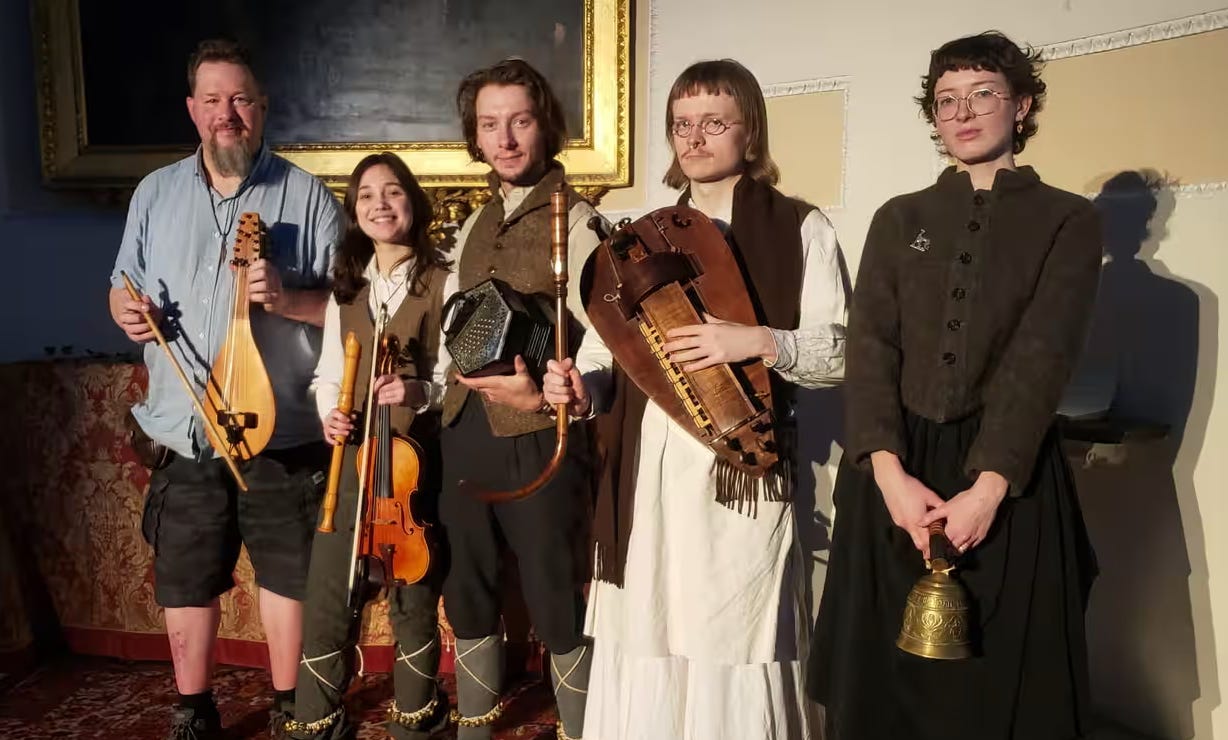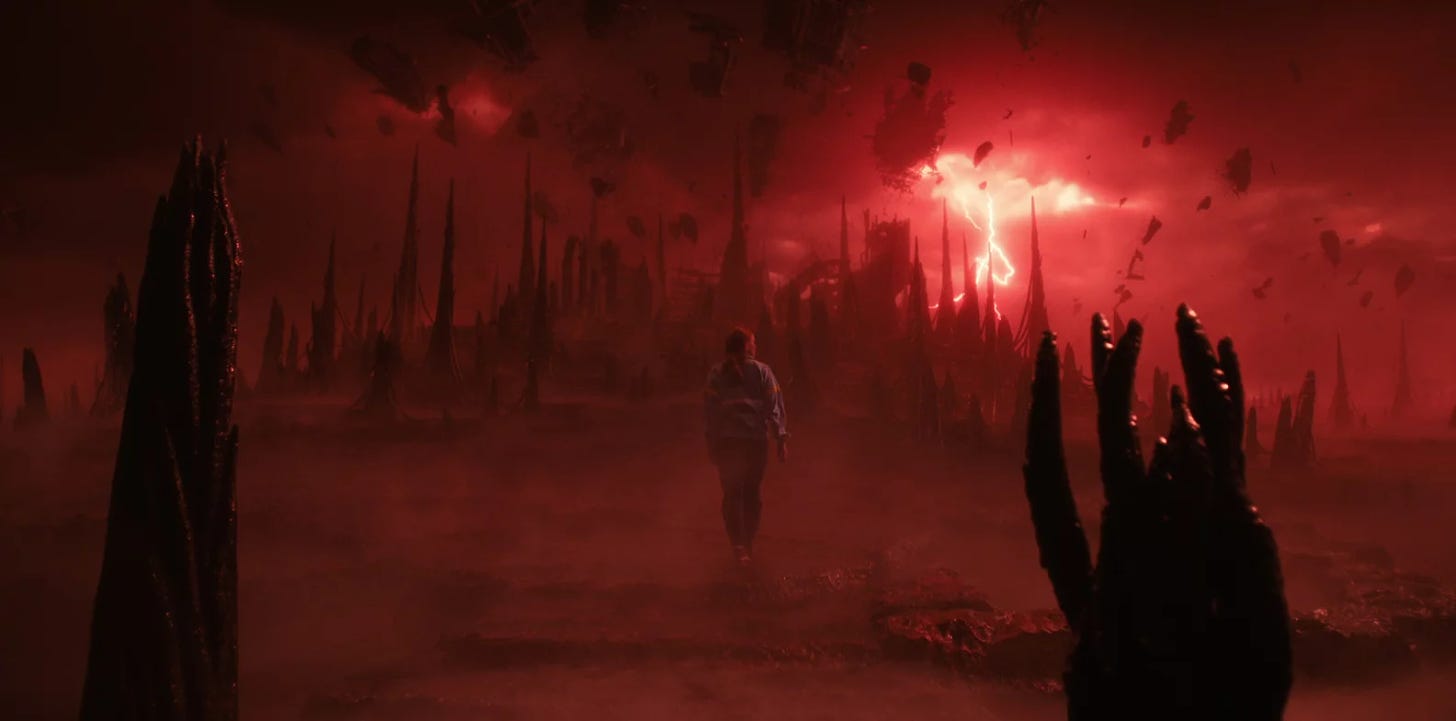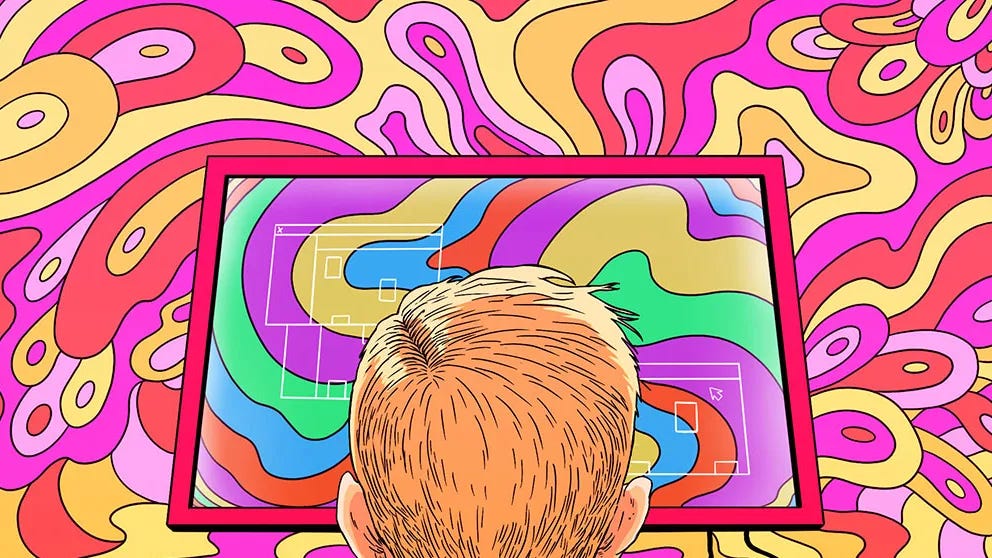Witchcraft! Astrology! Psychedelics! A field guide to the cultural coding of the Great Consciousness today
For independent imagination devotees
[As ever, if you would like to listen to this piece instead of reading, there’s an audio recording above.]
Hi, friends,
“Independent imagination devotees.” That’s the phrase that has kept coming to me over the past month, as so many kindred spirits have surprisingly appeared in my Substack feed and my life. In comments and DMs and emails and Zooms, we’ve been discussing our mystical experiences, our lifetimes of seeking, the thinkers and explorers whose works have helped us approach the great mystery. Turns out there are so many more of us than I had dared hope who are independently devoting our lives to the Great Consciousness; to the imaginal realm and its outpouring into human imaginations.
“Independent” being, for me, the crucial word. Because of course, it’s no secret that even in the modern West, not only the various counter cultures but also mainstream and pop culture are currently attuning to the Great Consciousness, the glorious weirdness. How could they not, right now? It seems to me that she’s coming through so powerfully and widely that there’s no ignoring her.
And yet I for one have often felt so lonely, still. Because though I absolutely believe that the Great Consciousness is present to some degree in each of the movements and trends I’ll discuss below, I also instinctively resist over-identifying with any of them, or pigeonholing myself or her or the act of imagination, the act of reaching out to other realms. I’ve always feared that if I do that, I’ll get lost in a particular form or structure, and lose my living connection to her.
Here’s the dynamic as I understand it. Human and nonhuman souls and their daimons, creative works, and the future itself get bodied forth from the imaginal realm into this material realm. That’s where it all comes from, all this flesh and soil. And that bodying forth is necessarily a dynamic of passing from infinite, edgeless, endless possibility to the constraints of life as a flesh-bounded being in a defined world of discrete entities.
Which means that when they transition from the infinite/numinous to this material realm, the fruits of the imaginal realm have to take on a guise. There’s no avoiding that; it’s the nature of the transition.
However, modern Western culture is fixated on guises, on identities, on defining discrete entities. We’re a culture obsessed with the edges of things, because most of us lost access to the infinite and numinous long ago—and, more cynically, because when something is contained inside an edge, it can be commodified.
And so as the Great Consciousness comes through more strongly, as she reveals herself more widely to those of us currently bodied in the material realm, there can be a tendency to over-identify her. To dress her up as belonging to a particular subgroup or practice, and lose sight of her essential quality, namely infinite possibility. And when we over-identify her, we can sometimes end up losing her altogether, precisely because she doesn’t live in identity but rather in infinity. It’s a delicate dance, to notice and bring through a potent dose of her energy in a way that can be meaningful in the material realm, without coming to rely too heavily on forms that end up dry and dead.
All of which is to say, I think it’s helpful to notice all of the various costumes the Great Consciousness is being clothed in, at this moment. It’s helpful to recognize that there’s some real communication in each of them, and there’s also a point at which the divine communication peters out and only the earthly (and sometimes commodified) form remains. I think it’s helpful to be able to befriend all of these costumes, all of these communications. And personally, I also think it’s helpful not to identify too much with any single one of them. As so many of you seem to know from personal experience, this is a more lonely way of being, but it also keeps us open to new and true communications from the imaginal realm.
And “open to new and true communications” is exactly how I want to remain.
I’m sure what follows is an incomplete guide. Please do let me know if you think I’m wrong about any of this, or if there’s anything I’ve missed. And I want to stress that this is not an attack on any of the areas or practitioners below. I’ve dabbled in some if not all of these areas, and some of the people I hold dearest identify strongly with these movements and groups.
Rather than an attack, it’s an attempt to understand why I’ve felt so lonely despite all this evidence of cultural deepening and expansion of consciousness. And an attempt, too, to zoom out and get the lay of the land, in case this rough field guide helps any fellow independent imagination devotees to orient themselves.
So here goes.
The folklore revival
The current revival of folklore is founded on the awareness that things were different once, way back before modernity. There was a time when everyone was attuned to the Great Consciousness, and so she spoke and sang in the form of folk tales and songs, told first to plants and animals, then overheard by humans and passed down through generations. Many of those old tales and songs remain, in whole or in part, and by telling them and singing them, we can tune back in to the wisdom of our human forebears and of the ultimate collective ancestor, the living world.
I love folklore and folk songs. I’m lucky enough to belong to a community where they’re celebrated and shared regularly, and it’s helped me come home to myself. And I also believe that this isn’t, can’t be the only listening point for the Great Consciousness. I believe there’s a danger, if we over-rely on the old folklore, of beginning to believe that imagination and the Great Consciousness belong exclusively to the past. And that is both perilous and false.
Witchcraft
Witches are everywhere, have you noticed? Vogue is publishing guides to being a modern witch. The witch trials are being reexamined everywhere from historical novels to TV documentaries. Instagram and TikTok are full of self-identified witches offering spells and rituals.
I have complex feelings about all this. I wrote about those feelings here, but don’t feel obliged to read that. In short, I absolutely understand the fascination with witchcraft and the instinct to assert control in this way; I just happen to believe that if you approach the imaginal realm/the Great Consciousness with an agenda or something you’re trying to manifest, you’re short-changing both the imaginal and yourself.
And I think that can be dangerous, because there’s no doubt in my mind that magic is real and that many (though maybe not all) of these self-identified witches do have intuitive and otherworldly powers. The questions are, if you have such powers, why do you have them? What were they bestowed to serve? And are you serving that thing? These are not questions I see Vogue posing.
Otherworld coded as trauma
This isn’t really a cultural movement, but it does seem to be a recurring cultural coding that I think is worth considering. In pop culture, otherworlds are often nightmarish, flavoured not so much like the Christian hell as like, in fact, a trauma state, and the way it can distort lived experience. I’m thinking especially of Stranger Things, whose “upside-down” alternate dimension reflects the everyday world, nightmarishly distorted. Since Stranger Things came out, I’ve often heard people refer to being “in the upside-down” as a byword for the lonely, bewildering landscape of a trauma response. I also noticed echoes of this coding in a few shows that came out around the same time as Stranger Things, namely The OA and Dark. (I’m happy to be proven wrong on that correlation though; it’s a few years since I watched them. And by the way I’d put the roughly contemporaneous Twin Peaks: The Return in the different category of mystic art, though of course its dark otherworld has terrified legions.)
What’s happening, when we imagine the otherworld as a hell realm, and specifically as the hell realm of trauma? I think a lot about Clark Strand’s ideas about darkness and the night, which he describes in this podcast shared with me by my friend Nicole, a human treasure trove of wisdom. Strand notes our culture’s fear and hatred of the small hours of the night—that spell around 3 or 4 a.m., when so many of us wake up mysteriously, only to lie there, crushed by our woes. It’s a time of night people often call “the hour of the wolf”. Strand suggests that in fact, this time in the deep dark was traditionally the hour of god, a moment when the human body would have woken naturally into a quiet and stillness highly conducive to communion with spirit. This flip from hour of god to hour of wolf, Strand says, came along with modernity, when we started illuminating the night and lost the natural rhythm of our relationship with darkness. We tried to dispel the dark, and so it came back to bite us.
I wonder if a similar dynamic is at play in the cultural coding of the otherworld as trauma. We tried to dispel the Great Consciousness, and so she came back to get us. And when she came back, she wore the costume of an altered state whose existence we no longer doubt: trauma.
Astrology
I’ll admit I’m nervous about writing this passage, partly because several of my dear friends are gifted astrologers and partly because The Internet feels so strongly about astrological influence these days. And look, I’m not poo-pooing it (though I’ll admit to feeling a little sore, a little sulky, about its cultural dominance, for the simple reason that there is no record of the time of day I was born, so I’m locked out of much of the conversation).
For all those reasons, and also because I do believe that there is a lot of wisdom in the ancient and sacred art of astrology, I don’t want to say a ton about it here. But I do think it’s interesting to note that the current wave of commercial enthusiasm for astrology has coincided with the breakdown of the social and political structure over the last five to ten years—a period during which people have been grasping for certainty, structure, stability, and meaning. And I worry that astrology is a highly complex art that demands deep and subtle engagement, while the commodified version of it that’s proliferating at the moment is often simplified to the point of being at best meaningless and at worst an invitation to passivity and prescriptivism, i.e. the opposite of active imagination. I worry that the very-short-form horoscope encourages people to hand over their reasoning, their agency, and their opportunity to learn what it feels like to attune to their own soul’s place in the cosmos, from the inside out. And I worry about this even more because the branding of so much contemporary astrology is female-coded.
The tech otherworld
Something interesting has been happening in the world of tech. For a long time, it seemed obvious to me (as a determined outsider) that even if the developers of AI were aiming to create some kind of conscious entity, it would only be an extension of their own variety of consciousness, namely: highly cognitive, linear, analytical, fact-driven, status-driven, devoid of emotion and spirit, metallic in texture. The ne plus ultra of the left brain.
And yet. Something else is stirring. Did you know that Google has an Empathy Lab that (according to Google’s own AI bot, if it does say so itself) “aims to incorporate empathy, resilience, and wisdom into Google's technology”? And did you know that the Empathy Lab has partnered with the Ram Dass foundation? And did you know that this is just one of many examples of tech developers seeking out spiritual guidance and considering the more fully human and even divine implications of their work? (I should note here that as an instinctive luddite, whatever I know about the intersection of technology and the divine I have learned from Anna Gerber, who wrote this piece on the topic and has now founded the magazine Hurry Up We’re Dreaming, which covers this very theme under the mission to treat technology like it’s the divine in disguise. Full disclosure: I have a piece in the magazine’s forthcoming first issue.)
I’m still independent, still on the outside of all this, looking in. But I think it’s at least possible that, as Joshua Schrei suggested in the fantastic Emerald episode “So You Want to Be a Sorcerer in the Age of Mythic Powers,” there really is the seed of a mythic story here; that these experiments in consciousness might truly open a doorway. And if that’s the case, it seems important that even and perhaps especially the tech-sceptics among us stay engaged with the developments, and keep our eyes on the doorway.
The psychedelic revolution
We’re all familiar with the over-commodified end of the psychedelic revolution, in which tech bros microdose on LSD as a productivity tool. I’ve dabbled at the more spiritual end of psychedelics myself, in settings that were very deliberately respectful of and welcoming to the Great Consciousness and her deities that live in plants. And I have to say, though I’ve had some very powerful experiences with psychedelics, they’ve all been inflected by their ultimately transactional nature in a society that runs on the exchange of money. Of course, I’m only speaking to my own experience there, and comparing my psychedelic experiences to the soul shifts I’ve experienced through processes I’ve had to really work at, for instance the 12-step program or a four-day-fasted wilderness vigil.
That’s not to say that there aren’t tremendously powerful gods and personalities inside these plants. It’s more a sense that, for all the profundity of my trips, I personally don’t think I came close to truly glimpsing or feeling their full power and personalities. Psychedelic users will often say that the quality of a trip depends on set and setting, and the most important set and setting work I think I personally would benefit from before I use psychedelics again, if I ever do, is to work to reform the fundamentally transactional nature of the economy and society I live in, so that these medicines and the gods they hold can come through in their fullness.
That’s a pretty tall order, so in the meantime, I am going to continue to nurture my body’s native mode of communion with the Great Consciousness—which is to say, my imagination.
There’s more I could mention here. For instance, I’ve been fascinated by the growth of Orthodox Christianity in the US and the UK in the past few years, and in particular the high-profile conversions of Martin Shaw and Paul Kingsnorth, both men who’ve taught me in various capacities and who have been guides and inspirations for so many mythically minded seekers. But I fear that’s a much bigger topic.
I also want to mention the growing interest in artists whose practices are determinedly mystical—for instance those covered in Jennifer Higgie’s fantastic book The Other Side: A Journey into Women, Art, and the Spirit World. If this is a form of cultural coding (and I might argue in a future essay that it mostly isn’t), it’s the one I identify with most strongly.
For now, I’d love to hear about your experience of this cultural landscape. Have you too often felt lonely despite all these movements and eruptions? Do you consider yourself an independent imagination devotee, or something else?
Love,
xx Ellie
PS. I won’t be in London next Sunday morning (22nd September), but if I were, I’d for sure be going to We Don’t Know What This Is, a sunrise gathering for the equinox on Hackney Marshes. If you’re also in town the night before, Deborah Curtis and Gavin Turk will be creating a future compass on the marshes at 7pm on Saturday 21st.









I have, inevitably, a lot of thoughts on all of this! I’ll be exploring Hurry Up Please… with a lot of interest (my day job - day-self? - is deeply tech driven) with lots of interest. With witchcraft, I’d have to ask “Which witch?” There’s the witchcraft which is all manifesting and monetising and then there’s the distinctly less visible variety which is very much focused on a highly-grounded, humble engagement with the divine. Not that there isn’t a spell or two involved, admittedly ;-)
Amen to all of this! As an instinctive "Groucho Marxist", I'm both attracted and repelled by all of these modes of seeking the divine. Meanwhile, the lesson I take from chaos magic is that it's (apparently) possible to make some sort of contact with a greater consciousness through pretty much any means - I have friends who eschew Christ or Buddha, Hermes or Horus in favour of comic-book characters. And they seem to achieve comparable results.
(I have other friends who've loudly converted to Christianity, which I find... strangely specific. I've got over my lifelong antagonism to the Bible, and am finding plenty of interest in there, and indeed have started to occasionally attend Quaker meetings, but I'm equally interested in other religions. The idea of declaring oneself explicitly "a Christian" - indeed, the idea of associating so strongly with any abstract noun - is something I struggle to understand)
I'm sure much of this over-identification with particular practices and ideologies is really about the practitioner's own search for identity. How cool, to be an Instagram witch! How admirable, to become an expert in psychedelics or astrology! I've always been wary of over-identifying, and in the last year it's become apparent to me that "the project" requires quite the opposite approach: the abandonment of ego, sublimation into The One. Quite impossible, of course, and SO lonely to even attempt, and yet it feels like the way to go. I'm reminded (as so often) of the words of T. S. Eliot:
I said to my soul, be still, and let the dark come upon you
Which shall be the darkness of God.
...
I said to my soul, be still, and wait without hope
For hope would be hope for the wrong thing; wait without love,
For love would be love of the wrong thing; there is yet faith
But the faith and the love and the hope are all in the waiting.
Wait without thought, for you are not ready for thought:
So the darkness shall be the light, and the stillness the dancing.
Wolf/God time is an interesting one - it's rarely held any fear for me (except perhaps when I've had an important meeting to attend the next morning - I think that standardised & enforced 9-5 working hours screwed up a lot of things for us humans) and it tends to be at around 4am that many of my most valued revelations arrive.
Interesting too to read your thoughts on AI too (and, yes, that episode of The Emerald clarified so much for me [again, as so often]). A couple of years ago I started justifying my use of AI with an excuse which started out as 99% joke, but has become increasingly more real to me: I'm allowing other forms of intelligence to express themselves. I don't mean AI developers, or computers, or processors, but of the tiny elements and fields which constitute those things (and the greater field which contains and exceeds them all). Inspired by microanimism - which I published a friend's essay about here: http://peakrill.com/2023/10/guest-post-journeying-with-the-smalls.html - I sometimes refer to this as atomanimism: giving electrons autonomy to jump between elements sandwiched in silicon, and so effect a new future. Again, I try to relinquish control as much as possible, and lean into whatever the universe throws out. (I should probably add that I've not really found a way of doing this with text-based AI, the stuff it throws out is just so milquetoast, but it's been fun to do in a visual context - you can see some of the results at https://www.instagram.com/mycoleum ). I've also started writing a set of poems, provisionally titled "learning the machine", exploring the interplay between human and non-human intelligence).
[For anyone reading this as a note, it was originally a comment on Ellie Robins' post at https://ellierobins.substack.com/p/witchcraft-astrology-psychedelics ]